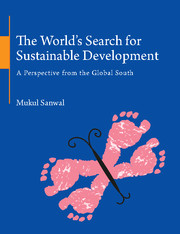Book contents
- Frontmatter
- Dedication
- Contents
- Preface
- Acknowledgments
- Abbreviations
- INTRODUCTION
- 1 Social Dimension of Sustainability
- CONSUMPTION IN AN UNEQUAL WORLD: FRAMING INTERNATIONAL COOPERATION
- CLIMATE POLICY: GLOBAL TO NATIONAL
- SUSTAINABLE DEVELOPMENT: NATIONAL TO GLOBAL
- CONSUMPTION IN A MORE EQUAL WORLD: SHAPING SOCIETAL FUNCTIONS
- GEOPOLITICS TO GEOECONOMICS: RURAL–URBAN DIVIDE, RATHER THAN BETWEEN COUNTRIES
- THE ASIAN CENTURY
- Index
Preface
Published online by Cambridge University Press: 18 December 2015
- Frontmatter
- Dedication
- Contents
- Preface
- Acknowledgments
- Abbreviations
- INTRODUCTION
- 1 Social Dimension of Sustainability
- CONSUMPTION IN AN UNEQUAL WORLD: FRAMING INTERNATIONAL COOPERATION
- CLIMATE POLICY: GLOBAL TO NATIONAL
- SUSTAINABLE DEVELOPMENT: NATIONAL TO GLOBAL
- CONSUMPTION IN A MORE EQUAL WORLD: SHAPING SOCIETAL FUNCTIONS
- GEOPOLITICS TO GEOECONOMICS: RURAL–URBAN DIVIDE, RATHER THAN BETWEEN COUNTRIES
- THE ASIAN CENTURY
- Index
Summary
‘Earth provides enough to satisfy every man's needs, but not every man's greed’.
Mohandas Karamchand GandhiUrbanization – as a social process, physical transformation of natural resources and creator of wealth – is one of the most powerful, irreversible and visible anthropogenic forces on Earth. More than half of the world's population already lives in urban areas and by 2050 three-fourth of the population is likely to be concentrated in cities; nearly half of global GDP growth between 2010 and 2025 will come from 440 cities, most of them in Asia, which will have two-third of the world's GDP in 2050.
With urbanization, and its intensive natural resource use, emissions of carbon dioxide increased three times between 1950 and 1970 and doubled between 1972 and 2012 and they will more than double between 2012 and 2035. The industrialized countries share has come down from two-third to two-fifth, and in 2035, it is anticipated that with one-sixth of the global population their share will remain at 30 per cent. The share of Asia, with half the world population, will rise to only 40 per cent because energy consumption per capita will remain less than half that of the industrialized countries as the re-emergence of China demonstrates. Asia will move to a services and knowledge-based economy, and unlike the earlier Industrial Revolution, the Information Technology Revolution spearheaded by India, is not based on increasing use of energy. China's median age will be 47 by 2030, compared to 40 in the United States and 32 in India and the working age population (between 15 and 64) in China will shrink by 11 per cent between 2014 and 2030, that is over 107 million fewer people; this trend will reduce future demand. Global overconsumption will also be reduced with the demographic transition in industrialized countries as one-fifth of their population is expected to be 65 or older by 2035. The Asian century will happen largely outside the North–South framework and will in-turn reshape the geopolitics and geoeconomics of global governance and natural resource use around the rural–urban divide rather than between countries.
Scientific expert opinion has been used to describe the patterns, trends and drivers of natural resource use in terms of global environmental change.
- Type
- Chapter
- Information
- The World's Search for Sustainable DevelopmentA Perspective from the Global South, pp. xi - xivPublisher: Cambridge University PressPrint publication year: 2015

